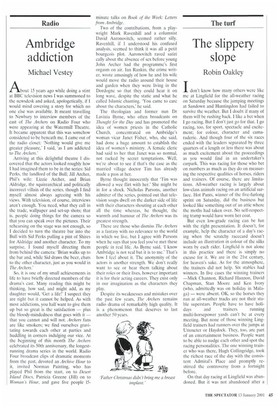Radio
Ambridge addiction
Michael Vestey
About 15 years ago while doing a stint at BBC television news I was summoned to the newsdcsk and asked, apologetically, if I would mind covering a story for which no one else was available. It meant travelling to Newbury to interview members of the cast of The Archers on Radio Four who were appearing at the Watermill Theatre. It became apparent that this was somehow considered to be beneath me. I came out of the radio closet: 'Nothing would give me greater pleasure,' I said, as I am addicted to The Archers.'
Arriving at this delightful theatre I discovered that the actors looked roughly how I had imagined them to be in the series: Sid Perks, the landlord of the Bull; Jill Archer, Phil's wife: Lizzie Archer, and Brian Aldridge, the squirearchical and politically incorrect villain of the series, though I find myself almost always agreeing with his views. With television, of course, interviews aren't enough. You need, what they call in the trade, wallpaper and set-up shots; that is, people doing things for the camera so that you can speak over the pictures. Their rehearsing on the stage was not enough, so I decided to turn the theatre bar into the Bull with Sid Perks pulling a pint of Shires for Aldridge and another character. To my surprise, I found myself directing them from behind the camera: 'Brian walks up to the bar and, while Sid draws the beer, chats to the other character, just as you would in The Archers.'
So, it is one of my small achievements in life to have briefly directed members of the drama's cast. Many reading this might be thinking, how sad, and might add, as my daughter would, 'Get a life!' I suspect they are right but it cannot be helped. As with most addictions, you half want to give them up but so great is the satisfaction — plus the bloody-mindedness that goes with it — that you cannot and will not. Archers fans are like smokers; we find ourselves gravitating towards each other at parties and huddling in corners indulging our vice. At the beginning of this month The Archers celebrated its 50th anniversary, the longestrunning drama series in the world. Radio Four broadcast clips of dramatic moments from the past, devoted an Archive Hour to it, invited Norman Painting, who has played Phil from the start, on to Desert Island Discs, Patricia Greene (Jill) on to Woman's Hour, and gave five people 15 minute talks on Book of the Week: Letters from Ambridge.
Two of the contributions, from a playwright Mark Ravenhill and a columnist David Aaronovitch, seemed rather silly. Ravenhill, if I understood his confused analysis, seemed to think it was all a petit bourgeois plot. Aaronovitch raved satini cally about the absence of sex before young John Archer had the programme's first orgasm on air. Ian Rankin, the crime writer, wrote amusingly of how he and his wife would move the radio around their house and garden when they were living in the Dordogne so that they could hear it on long wave, despite the static and what he called Islamic chanting. 'You came to care about the characters,' he said.
The theologian and former nun Dr Lavinia Byrne, who often broadcasts on Thought for the Day and has promoted the idea of women priests in the Catholic Church, concentrated on Ambridge's woman vicar Janet Fisher, who, she said, had done a huge amount to establish the idea of women's ministry. A female cleric had said to her that Janet was so normal, not racked by secret temptations. Well, we're about to see if that's the case as the married village doctor Tim has already made a pass at her.
Byrne thought innocently that 'Tim was allowed a wee flirt with her.' She might be in for a shock. Nicholas Parsons, another admirer of the series, pointed out that television soaps dwell on the darker side of life with their characters shouting at each other all the time whereas, he thought, the warmth and humour of The Archers was its greatest strength.
There are those who dismiss The Archers as a fantasy with no relevance to the world in which we live, but I agree with Parsons when he says that you feel you've met these people in real life. As Byrne said, 'I know Ambridge is not real but it is to me.' That's how I feel about it. The anonymity of the actors is another strength. We don't really want to see or hear them talking about their roles or their lives, however important it is for their acting careers. They exist only in our imagination as the characters they play.
Despite its weaknesses and mistakes over the past few years, The Archers remains radio drama of remarkably high quality. It is a phenomenon that deserves to last another 50 years.






























































 Previous page
Previous page